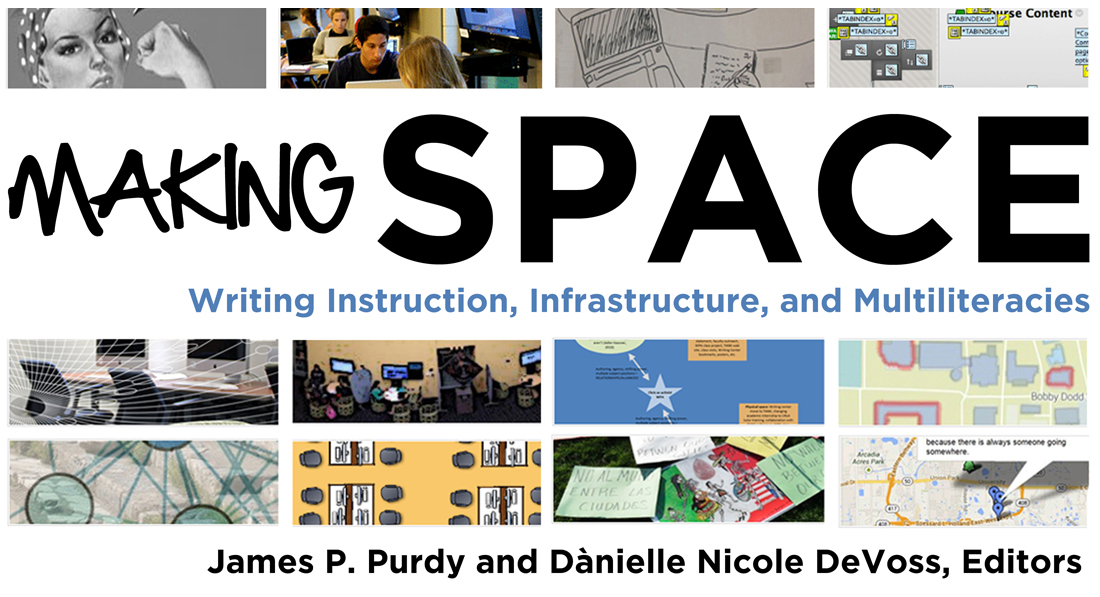The idea for Making Space: Writing Instruction, Infrastructure, and Multiliteracies began at the 2012 Computers and Writing Conference (http://siteslab.org/cwcon/2012/). The conference theme of architextures got us thinking about the ways in which physical and virtual architecture—and the processes of architecting—shape and are shaped by the creation, distribution, and reception of texts. At the conference, we both attended a hands-on session Saturday afternoon in Tompkins Hall on the North Carolina State University campus, and a conversation immediately after the session led us to see the value of bringing together multiple voices on how writing instructors propose, design, defend, and use the infrastructures needed for writing instruction and writing studies research in both brick-and-mortar and online venues.
 The conditions that led to the spark for this project are not incidental. We were together in a space that facilitated interpersonal conversation, where we were “students” in a classroom environment that was unfamiliar to us. The conference theme and resultant session content, together with the new online proposal submission and schedule management system for Computers and Writing conferences, http://siteslab.org/cwcon/, as well as the experience of navigating a campus unfamiliar to us heightened our attention to the ways in which virtual and physical spaces shape our movement, our conversations, and our scholarly progress. Our movement through the conference—both through the session proposal submission, review, acceptance, and scheduling process, as well as to and from and around the North Carolina State University campus—was mediated by a variety of spaces and their supporting infrastructures: Moodle, Internet service providers and wifi access, computers, busses, airplanes, signs, walkways, and so forth.
The conditions that led to the spark for this project are not incidental. We were together in a space that facilitated interpersonal conversation, where we were “students” in a classroom environment that was unfamiliar to us. The conference theme and resultant session content, together with the new online proposal submission and schedule management system for Computers and Writing conferences, http://siteslab.org/cwcon/, as well as the experience of navigating a campus unfamiliar to us heightened our attention to the ways in which virtual and physical spaces shape our movement, our conversations, and our scholarly progress. Our movement through the conference—both through the session proposal submission, review, acceptance, and scheduling process, as well as to and from and around the North Carolina State University campus—was mediated by a variety of spaces and their supporting infrastructures: Moodle, Internet service providers and wifi access, computers, busses, airplanes, signs, walkways, and so forth.
We knew we wanted the project to take the form of a digital book to allow contributors to readily include images and diagrams and to use a range of design affordances to make their arguments. The journey to complete the project helped to reaffirm the collection’s argument that the range of spaces where our writing instruction and research take place necessitate careful consideration and analysis—that teaching and researching writing require, shape, and are shaped by both digital and material infrastructures. As we explain in the Preface to the collection (http://www.digitalrhetoriccollaborative.org/making-space/), we did not always intend, or indeed, even envision, the collection being published in two related venues, on the Sweetland DRC website in its original webtext design and as an enhanced pdf for the DRC book series with the University of Michigan Press. This need and opportunity arose from infrastructural concerns—particularly to balance a desire to respect the designs of contributors’ chapters and the collection’s interface with a desire to ensure the long-term accessibility and storage/archivability of the collection. This tension is not unique to our work, and we hope that our response serves as one example that others might follow, particularly as opportunities and venues for digital publication of teaching and research materials flourish.
Bringing this volume to fruition entailed some of the very same infrastructural elements about which the book’s contributors write. It required face-to-face meetings at conferences, virtual meetings via Google Hangouts, email exchanges, and telephone calls. It required collaboration among us as editors, the contributing authors, the DRC staff, editors from University of Michigan Press, reviewers, a coder, a usability and accessibility specialist, research assistants, and support staff at our respective institutions. It entailed use of Google Drive and Google Docs cloud computing space; server space at Michigan State University; Microsoft Word and Excel; FTP; a variety of web browsers for testing (including Mozilla Firefox, Google Chrome, and Microsoft Internet Explorer); and Adobe Dreamweaver, Photoshop, and Acrobat.
These multiple layers of human, technological, material, digital, and physical infrastructure supported, challenged, facilitated, complicated, and influenced our processes and our product. We could not have completed the project without them, and the project would not have been the same had these infrastructures been different—or absent.
We hope Making Space, by providing example case studies, analyses, and theoretical discussions, goes some way toward making visible and providing valuable data to support that our work needs and merits infrastructural support. We encourage you to engage with the collection and read the smart, creative, fraught, and successful ways our contributors make the case that making space is not incidental but fundamental to our day-to-day teaching and researching responsibilities.
